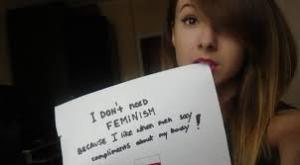By Roberta Nin Feliz
Why women don’t need feminism anymore

Second-wave feminists watch in disappointment as the feminist movement comes to a shambles with women claiming why they DON’T need feminism. The campaign called “Women Against Feminism” has women turning to social media to proclaim why they don’t need or want feminism through selfies of themselves holding up handwritten placards. Anti-feminist arguments range from saying that equality of the sexes already exists, to proclamations that modern day feminism portrays men as misogynist while neglecting the issues men face in society.
According to Merriam-Webster, “feminism” is defined as “the theory of the political, economic and social equality of the sexes,” and, “organized activity on behalf of women’s rights and interests.” Yet many anti-feminists argue that modern day feminism ostracizes white feminists in an attempt to diversify the movement. And there seems to be a new wave of men’s rights emphasized in this anti-feminism movement. The men’s rights movement can be traced back to the 1990s as a response to feminist accomplishments. In an attempt to balance this equality of the sexes, the anti-feminists deny what they call “social stigma concerning rape culture, misogyny and male patriarchy.” While anti-feminists argue that rape culture characterizes men as rapists, an alternative definition is provided by everydayfeminism.com, which defines rape culture as: “cultural practices that excuse or otherwise tolerate sexual violence.”
“I believe in equality, [but] saying all guys are pervs doesn’t solve the issue,” says a student at MCSM. “Guys getting raped isn’t as visible on TV as a woman being raped is. Just because guys tend to talk more about sex doesn’t mean they’re pervs. Not all guys are pervs.”
Responses from various blogs include:
“We don’t need feminism because feminism isn’t equal rights and it’s contradictory. Even the f****** name implies “women only”. You can’t just say you’re oppressed and the other side is privileged just because you feel your vagina keeps you from taking responsibility. If women were oppressed, why do they get government assistance if they can’t pay their child support, whereas a man goes to jail over it? And since when can’t men look at women? Women objectify David Beckham all the time!”
“I don’t need feminism because I strive for equality!”
“I don’t need feminism because rape isn’t a sexist crime. I don’t need feminism because rape isn’t a pity party. It’s a serious crime and deserves attention for victims being victims. Don’t give rape victims attention only because they are a woman”
“I don’t need modern-day feminism because I already have all the rights men have (thank you, 1st and 2nd waves of feminism). I am already equal to them, I don’t need more privileges.”
“I don’t need feminism because I refuse to be a victim, and I hate the victim culture that has risen around the new movement. I believe in individual responsibility.”
First-wave feminism which started in the mid-1800s focused on women gaining basic rights such as the right to vote. Second-wave feminism which started in the 1950s but didn’t take off until ten years later focused on women seeking reproductive and work rights. Results of second-wave feminism include The Equal Pay Act, passed in 1963, prohibiting unequal pay for women and men in the same job with the same skill level; and the 1973 Roe v. Wade Supreme Court decision making abortion legal in all 50 states. Abortion was illegal until then, resulting in the death of thousands of women due to illegal and badly-performed abortions. Third-wave feminism (or modern feminism) began in the 1990s and focused on integrating women of color into the movement while also tackling modern women’s issues.
In an interview with the Guardian actress Ellen Page says, “But how could it be any more obvious that we still live in a patriarchal world when feminism is a bad word? Feminism always gets associated with being a radical movement – good. It should be. A lot of what the radical feminists [in the 1970s] were saying, I don’t disagree with it.” Ironically, major pro-choice accomplishments of second-wave feminists were recently threatened by the potential passing of the Pain-Capable Unborn Child Protection Act, which prohibited abortion at 20 weeks, according to the claim that fetuses experience pain at that time. Republicans in the House were to vote on this bill January 22nd, the 42nd anniversary of the Supreme Court’s landmark ruling in Roe v. Wade which granted women the constitutional right to seek abortion at up to 22 to 24 weeks of pregnancy. However Republican Congresswomen like North Carolina’s Rene Ellmers and Jackie Walorski of Indiana forced their party to temporarily drop that more controversial act and vote instead to pass a less polarizing bill prohibiting federal funding for abortions. (This recent compromise suggests that Congress’s newly-elected Republicans are aware of the ever more diverse and shifting perspectives among American women voters, a group which includes old-school feminists and anti-feminists alike.)
According to the National Women’s Law Center, “the typical American woman who works full time, year-round, was still paid only 78 cents for every dollar paid to her male counterpart in 2013. For women of color, the gaps are even larger.” Today women still don’t have complete access to reproductive health care. Yet the strife of the very beginnings of the feminist movement has yet to die out. Modern feminists and organizations like NOW, the National Organization for Women, are fighting to prevent the recurrence of earlier struggles in the history of women’s rights.
